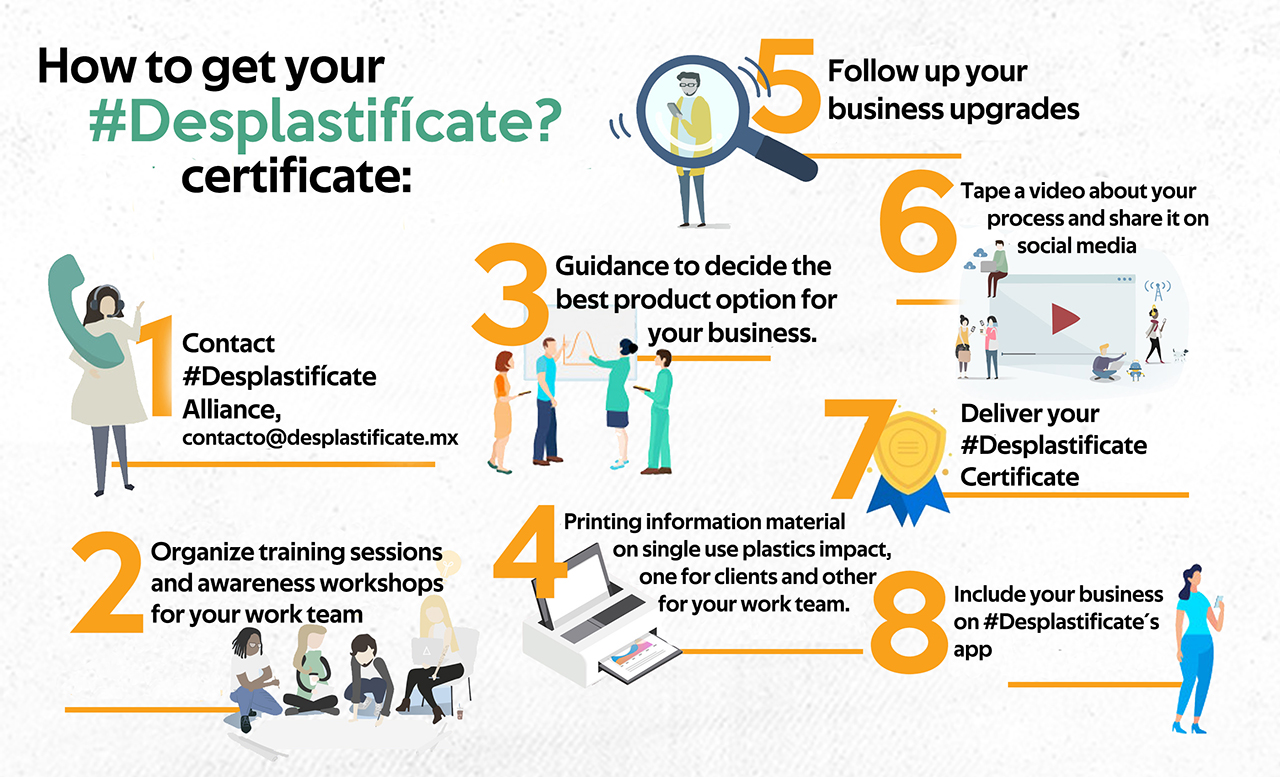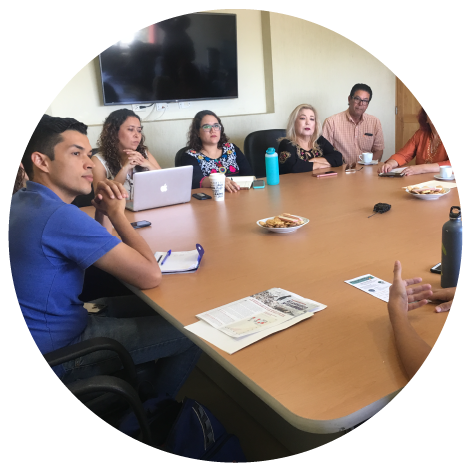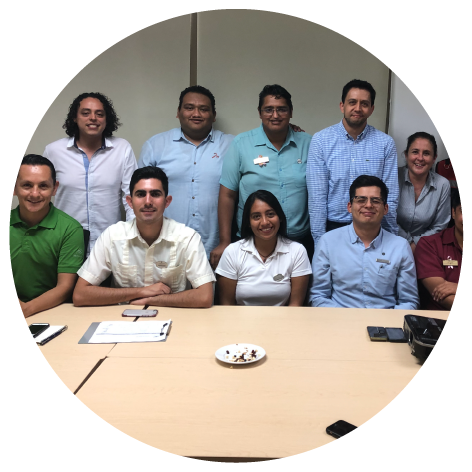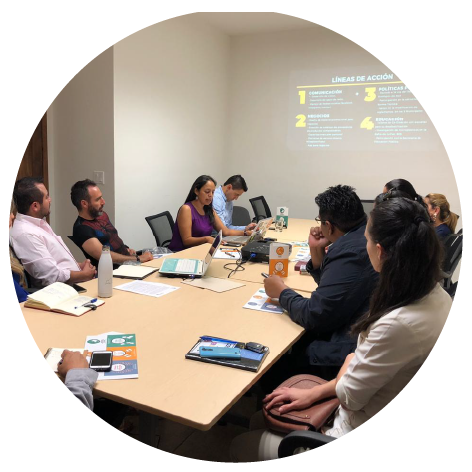
As of 2017, Ponguinguiola restructured its programmatic approach to recycling, given that a comprehensive solution to the problem requires reducing the production and consumption of single-use plastics. This is why, taking into consideration as well that it would be necessary to work together with other organizations, the #Desplastifícate alliance was created, which currently includes 35 non-profit organizations from the state of Baja California Sur. The alliance’s objective is to change consumption habits statewide in order to reduce and eventually eliminate single-use plastics, beginning with styrofoam take-out containers, plastic straws, and plastic grocery bags. The #Desplastifícate campaign seeks to promote empathy in all of our state’s citizens, and to increase their awareness of the powerful negative impact that the unrestrained use of these products has on public health and the environment.
The alliance is pursuing its goal along 4 main axes:
- Public policy
- Education
- Communication (Media)
- Businesses
1.- The Public Policy Committee:
Non-profit organizations, municipal government, state government, and chambers of commerce all collaborated together to develop the strategic plan which was used to introduce and pass a law which amended state environmental law to restrict three single-use plastic products: styrofoam, straws, and grocery bags.
- The work group that was established to structure the application of the Ecological Balance Law of the State of BCS, which was passed in August of 2018, had 14 meetings. These meetings were developed with key actors such as: representatives of the chamber of restaurants, hotels, malls, municipalities, researchers, plastics distributors, supply centers, and non-profit organizations. The result of these meetings was a technical guideline which will be published in February 2020
- They presented and participated in 10 sessions of the La Paz town hall council, and we had 10 meetings to work on the program by the ecology department, to inform, communicate, and enforce the law. The result was a draft of the enforcement program and its presentation before the alderman to submit for their approval.
- The alliance’s public policy committee had 12 assessment and planning meetings on actions to be carried out with representatives of government authorities and chambers of commerce.
2.- Education Committee
The education of children and young people is the most important part of creating agents for change. By teaching workshops and hosting conversations, we are trying to contribute to the formation of conscientious and responsible citizens who care for public health and the environment, both for future generations as well as for the present ones. The education committee uses a methodology called “Co-Creation Workshops” to develop material for use in educational centers. These workshops function by posing the impact of the problem, and ask participants to propose a solution that eliminates single-use plastics. They examine whether it is necessary to go through a phase of using compostable disposable products in order to eventually end up with a culture of using washable, reusable products that prevent the unchecked use of plastics and its attendant harm to public health. For this reason, the organizations that specialize in the education sector have actively participated in the following actions:
- Co-Creation Workshops
The education committee worked on impacting the educational centers through “Co-creation workshops,” which were based in a methodology of posing the impact of the problem and asking the participants to propose a solution that eliminates single-use plastics. They examine whether it is necessary to go through a phase of using compostable disposable products in order to eventually end up with a culture of using washable, reusable products that prevent the unchecked use of plastics and its attendant harm to public health. This is directed at school authorities so that they can make changes to their school environment, thereby transmitting those changes to the students and their parents. The workshop includes a follow-up to make sure the proposed goals are being met. The workshops have been taught in four out of Baja California Sur’s five municipalities, as well as in the Upper Technological Institute (Instituto Tecnológico Superior) at Tierra Blanca, Veracruz. - #Desplastifícate Curriculum:
The collaboration between Ponguinguiola, the Coastal Institute of Baja California Sur (Instituto Costero de Baja California Sur), and the program Education for Action (Educación para la Acción), has the objective of offering trainings, open-air experiences, and project-based learning to teachers, principals, and students of middle and high schools. The strength of this program comes from linking regional schools and the state’s Secretary of Public Education (SEP) with other organizations. The collaboration is currently developing a series of curricular proposals focused on topics such as: Biodiversity, Desplastifícate, Water, and Food Sovereignty. The curriculums are being developed with the approval and oversight of the Secretary of Public Education, with the intention of being applied in educational programs. The objective of the curricular proposal is a sequence of activities organized in 12 lessons to be developed over the course of a semester. Each lesson is aligned with the established standards (competencies) for students at the secondary level and invite multidisciplinary implementation. These lessons will guide students to design, develop, and implement a project -- using a scientific lens -- that reduces the consumption of single-use plastics, taking into consideration the conditions of their school, and seeking to raise awareness and inspire better decision-making on all levels, from the individual to the collective.
3.- Business Committee:
As agents of change, diverse South Baja Californian business interests have united to this movement in order to achieve the desplastification of our state. They are implementing simple actions, from the responsible party for each business to the staff, such as employee trainings, offering environment-friendly takeout container options and discounts to customers, by which they are avoiding the use of disposable products and reducing the use of plastic bags to zero. The businesspeople and entrepreneurs of Baja California Sur have been and continue to be a fundamental part of achieving this great change for a plastic-free planet. Through a relationship with the National Chamber of Restaurants and Seasoned Food Industry (CANIRAC) and the Hoteliers Association, we seek to create an important bond with this sector of society, since their participation in this transition is vital.
The businesses that participate in the trainings and follow-ups to reduce their plastics use and, are given badges of recognition and honors by #Desplastifícate through a 7-step process:

In 2019, we successfully awarded badges endorsed by the United Nations Environment Programme (PNUMA), which is part of the United Nations (UN), awarding a total of 12 badges in the Los Cabos municipality. There are 10 more badges in progress to being earned for 2020.
4.- Communication Committee:
As part of the communication strategy, we elaborated different printed, digital, and audiovisual materials. Since the beginning of this movement, we have distributed these materials in many different parts of the state through different platforms, such as social networks, press, and radio. Through these forms of communication, we are trying to reach the biggest possible portion of the population with #Desplastifícate’s message. More and more are joining in and taking action to care for our health and environment.
The forms of information dissemination for 2019 were based on informing the public that the new law prohibiting the use of three disposable plastic products (styrofoam containers, plastic straws, and plastic shopping bags) would take effect in the month of August. To spread this message, it was necessary to maintain an active social media presence (Facebook, Twitter, and YouTube). We succeeded in giving:
- 75 interviews
- 266 social media posts
- 6,133 reposts
- 89 graphic designs produced
- 3 radio spots transmitted in the entire state of Baja California Sur.
We also continued maintaining the website www.desplastificate.mx, active, which contains complete information about the program and activities that the #Desplastifícate alliace is developing and implementing.





